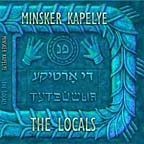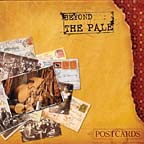Minsker Kapelye blows me away with "Tutejsi" (The Locals)
 Here's another case of a CD arriving in today's mail. I put it on the turntable to listen to while I study a bit. Never open the books. Just keep listening. From the opening "street sounds" featuring the electronic bells of the Minsk city tower to the closing Nign sung by Samuil Linkovskiy in his 80s, this is exquisite, intricate klezmer music and yiddish song introducing an unfamiliar klezmer sound—recreated from wax cylinders in many cases; from recordings of elderly Jews in Belarus made from 1997–2008. Who knew? Much of the field research was done by Dr. Slepovitch and the late Dr. Nina Stepanskaya to whom the CD is dedicated.
Here's another case of a CD arriving in today's mail. I put it on the turntable to listen to while I study a bit. Never open the books. Just keep listening. From the opening "street sounds" featuring the electronic bells of the Minsk city tower to the closing Nign sung by Samuil Linkovskiy in his 80s, this is exquisite, intricate klezmer music and yiddish song introducing an unfamiliar klezmer sound—recreated from wax cylinders in many cases; from recordings of elderly Jews in Belarus made from 1997–2008. Who knew? Much of the field research was done by Dr. Slepovitch and the late Dr. Nina Stepanskaya to whom the CD is dedicated.
The Minsker Kapelye consists of just three musicians: Dmitri Slepovitch on clarinet and other woodwinds, vocals; Tatsiana Kukel on tsimbl; Hanna Kharchanka on cello—a remarkably traditional ensemble playing traditional music as it may have been heard prior to the Holocaust and Soviet antisemitism, now revived and, at least on this recording, very lively and enlivening. The quality of the playing is extraordinary. the Belarusian alto cymbalom in the hands of Ms. Kukel is a revelation, but none of the playing is less than excellent, ranging from a classical formality to swinging dance music as the music demands.
In terms of repertoire, many of these melodies are recently recovered from wax cylinders recorded by Sophia Maggid in the '30s (1928–1938); others come from relatively modern sources, including a rousing "Ot Azey!" credited to the late German Goldenshteyn (Moldavia, Belarus, what's the difference :-)) and some brilliant rap & reggae improvisation in a lovely folk poem recorded from Hirsh Reles, the last Belarusian Yiddish writer, and, um, improvised here. It is touches like the rap, and the occasional interjection of the Minsk streetscape that help make this recording special. It is traditional music, yes, but traditional music as I enjoy it best—lovingly sung in the here and now. The title of the CD, "Tutejsi,"—The Locals, is derived from the name of a classic Belorusian novel by Yanka Kupala (so claim the liner notes—I am sadly ignorant on this score). It feels appropriate in terms of making a local (Belarusian) klezmer repertoire available to the rest of us, but also in terms of the neighborhood feel of the material. If only all neighborhood bands played this well.
The album closes with the singing of the father of Slepovitch's late research partner, singing words written by Slepovitch (from the translation in the liner notes):
I am strolling on the streets of the ghetto, / Over there, there are modern houses and new people. / And here inside and under my feet, there lives my lineage, the poets, / Who bless us with their soundless verses and songs.
The CD is lovingly produced with copious liner notes in Polish and English. You can get copies from the band's website. It's a keeper.
 For those who don't know yet,
For those who don't know yet,  It is with with great sadness that I announce the passing away of Sara Alexander.
She was an Israeli singer who settled in France after the 6 days war.
She was dedicated to working towards a better undertanding between israelis and palestinians and released about 10 recordings as well as 2 books, one of them calle Shalom Salam. With her we lost "a Mentsh" and as she was not very well known in North America except Quebec, I invite you to google her name and discover her work and her music.
It is with with great sadness that I announce the passing away of Sara Alexander.
She was an Israeli singer who settled in France after the 6 days war.
She was dedicated to working towards a better undertanding between israelis and palestinians and released about 10 recordings as well as 2 books, one of them calle Shalom Salam. With her we lost "a Mentsh" and as she was not very well known in North America except Quebec, I invite you to google her name and discover her work and her music.
